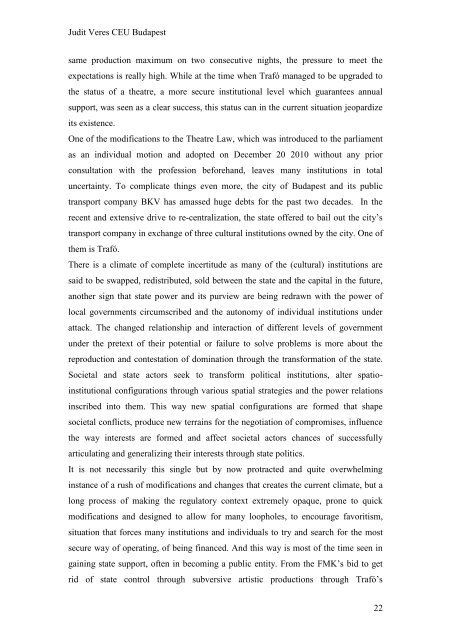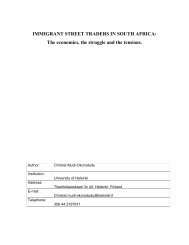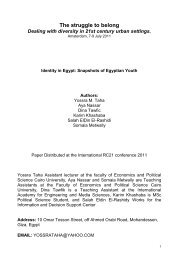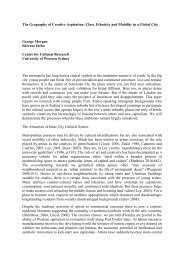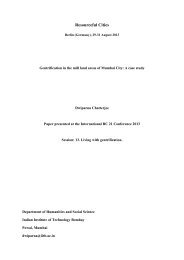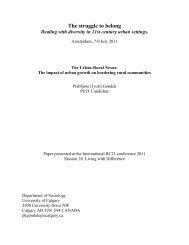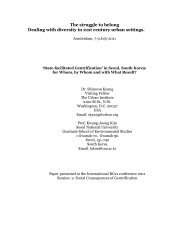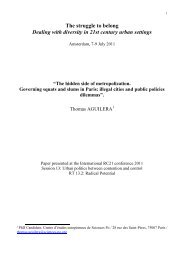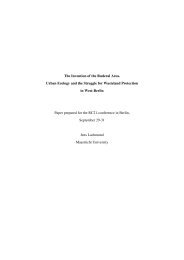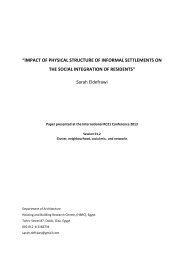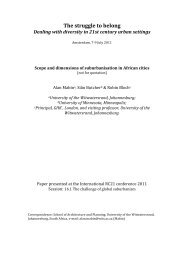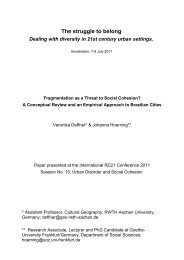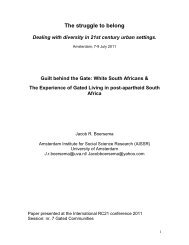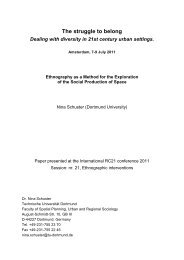Gentrification as a broad process of reurbanization - RC21 ORG ...
Gentrification as a broad process of reurbanization - RC21 ORG ...
Gentrification as a broad process of reurbanization - RC21 ORG ...
Create successful ePaper yourself
Turn your PDF publications into a flip-book with our unique Google optimized e-Paper software.
Judit Veres CEU Budapest<br />
same production maximum on two consecutive nights, the pressure to meet the<br />
expectations is really high. While at the time when Trafó managed to be upgraded to<br />
the status <strong>of</strong> a theatre, a more secure institutional level which guarantees annual<br />
support, w<strong>as</strong> seen <strong>as</strong> a clear success, this status can in the current situation jeopardize<br />
its existence.<br />
One <strong>of</strong> the modifications to the Theatre Law, which w<strong>as</strong> introduced to the parliament<br />
<strong>as</strong> an individual motion and adopted on December 20 2010 without any prior<br />
consultation with the pr<strong>of</strong>ession beforehand, leaves many institutions in total<br />
uncertainty. To complicate things even more, the city <strong>of</strong> Budapest and its public<br />
transport company BKV h<strong>as</strong> am<strong>as</strong>sed huge debts for the p<strong>as</strong>t two decades. In the<br />
recent and extensive drive to re-centralization, the state <strong>of</strong>fered to bail out the city‘s<br />
transport company in exchange <strong>of</strong> three cultural institutions owned by the city. One <strong>of</strong><br />
them is Trafó.<br />
There is a climate <strong>of</strong> complete incertitude <strong>as</strong> many <strong>of</strong> the (cultural) institutions are<br />
said to be swapped, redistributed, sold between the state and the capital in the future,<br />
another sign that state power and its purview are being redrawn with the power <strong>of</strong><br />
local governments circumscribed and the autonomy <strong>of</strong> individual institutions under<br />
attack. The changed relationship and interaction <strong>of</strong> different levels <strong>of</strong> government<br />
under the pretext <strong>of</strong> their potential or failure to solve problems is more about the<br />
reproduction and contestation <strong>of</strong> domination through the transformation <strong>of</strong> the state.<br />
Societal and state actors seek to transform political institutions, alter spatioinstitutional<br />
configurations through various spatial strategies and the power relations<br />
inscribed into them. This way new spatial configurations are formed that shape<br />
societal conflicts, produce new terrains for the negotiation <strong>of</strong> compromises, influence<br />
the way interests are formed and affect societal actors chances <strong>of</strong> successfully<br />
articulating and generalizing their interests through state politics.<br />
It is not necessarily this single but by now protracted and quite overwhelming<br />
instance <strong>of</strong> a rush <strong>of</strong> modifications and changes that creates the current climate, but a<br />
long <strong>process</strong> <strong>of</strong> making the regulatory context extremely opaque, prone to quick<br />
modifications and designed to allow for many loopholes, to encourage favoritism,<br />
situation that forces many institutions and individuals to try and search for the most<br />
secure way <strong>of</strong> operating, <strong>of</strong> being financed. And this way is most <strong>of</strong> the time seen in<br />
gaining state support, <strong>of</strong>ten in becoming a public entity. From the FMK‘s bid to get<br />
rid <strong>of</strong> state control through subversive artistic productions through Trafó‘s<br />
22


